 Burnout. We hear the word all the time—thrown around on social media like a badge of honour. Accompanied, of course, by the endless advice on how to prevent it. Sleep more. Exercise more, but not too much. Don’t work too hard. Don’t love too hard. Meditate. Heal your inner child. Fix your attachment style. Chase your purpose. Manifest the life you want. Be gentle, but not lazy. Hustle, but be grounded. Protein, but not the wrong type. Be successful, be spiritual, be safe, and embody your divine feminine. It’s relentless.
Burnout. We hear the word all the time—thrown around on social media like a badge of honour. Accompanied, of course, by the endless advice on how to prevent it. Sleep more. Exercise more, but not too much. Don’t work too hard. Don’t love too hard. Meditate. Heal your inner child. Fix your attachment style. Chase your purpose. Manifest the life you want. Be gentle, but not lazy. Hustle, but be grounded. Protein, but not the wrong type. Be successful, be spiritual, be safe, and embody your divine feminine. It’s relentless.
And yet, underneath it all, most of us are just trying to get through the day. Keep things afloat. Show up for our work, our families, our relationships. We want to feel okay. To feel seen. Loved. Safe.
For me, the Hoffman Process wasn’t a sudden epiphany—it was the natural next step after 15 years of running. Running from my emotions. Running across cities and continents. Running from love.
Mine was the slow-burn kind of burnout where you’re high-functioning and externally successful but internally lost. My life looked great on paper. Fast-paced, exciting, full of stories. Work has always come easily to me. But love? That’s been the harder path. I’ve spent years chasing emotionally unavailable men—drawn to the ones I had to earn. Where love came with conditions. My standards were high, but my walls were even higher. That, mixed with hyper-independence and trauma—being held at gunpoint, being sexually assaulted—left me not just guarded, but deeply untrusting of men.
To understand how I got here, we have to go back a bit.
To anyone looking in, my childhood was pretty ‘normal.’ My dad worked hard running a printing business to support us, and my mum stayed home to raise my sister and me. We weren’t a family that overflowed with affection, but we were solid. We were loved. We knew that. My dad in particular is a deeply loyal, dependable man. He shows love through action, not words—quiet and steady in his care. But as a sensitive child, I craved something more vocal. I needed to hear the words. I needed a connection to be named. That disconnect—between the love I knew I had and the love I felt—planted a seed of uncertainty in me.
 I was the classic younger daughter: creative, emotionally attuned, and quietly hoping someone would ask how I was feeling—and really wait for the answer. I became “the good one.” The overachiever. The peacekeeper. I learned that love was something to be earned through effort, through performance. That to be safe, I needed to excel.
I was the classic younger daughter: creative, emotionally attuned, and quietly hoping someone would ask how I was feeling—and really wait for the answer. I became “the good one.” The overachiever. The peacekeeper. I learned that love was something to be earned through effort, through performance. That to be safe, I needed to excel.
We weren’t emotionally fluent as a family. That’s not a criticism—it’s generational. My parents are wonderful people who did the best they could with what they had. But emotional literacy wasn’t part of our language. “Keep calm and carry on” was the silent motto (they are, after all, the children of the war generation). So I learned to override. To stay quiet. To push through.
I spent the majority of my teenage years confused by my own intensity and intuition. I was always trying to prove myself. To be chosen. To be good enough.
In my early twenties, I numbed. Drinking. Partying. Laughing loudly while quietly collapsing inside. After a breakup I couldn’t handle and a sexual assault by someone in my professional world, I ran—this time, to LA.
And for a while, LA worked. Sunshine. Good friends. Beach weekends. A great job. From the outside, it was the dream. But inside, I felt hollow. Performative. I had lost myself in the performance. And underneath the surface? I was burning out. My nervous system was shot. My relationships were intense, then absent. I was swinging between extremes, addicted to the highs and dreading the inevitable crash. Still striving. Still chasing.
Then came the moment that changed everything.
It was just after lockdown. I was walking home along a familiar street. A car pulled up. Three masked men jumped out. One of them shoved me into a driveway, a gun pressed to my head. I will never forget the feeling of the cold metal forced onto my forehead. They ripped my necklaces off—one of which belonged to my grandmother. They ran. I ran after them—adrenaline-fuelled and disoriented—only for them to turn the gun on me again.
The next day, they shot a man nearby for refusing to hand over his dogs.
That moment shattered something. I couldn’t pretend anymore. I couldn’t push through. The trauma cracked open everything I’d been holding in.
 I started therapy. Somatic work. Equine therapy with the incredible Belinda, we rode horses through the Canyon like it was a purge. I felt free, raw, wild. I unpacked everything I could. But I still felt stuck. I didn’t know if it was LA or me. I hadn’t connected the dots.
I started therapy. Somatic work. Equine therapy with the incredible Belinda, we rode horses through the Canyon like it was a purge. I felt free, raw, wild. I unpacked everything I could. But I still felt stuck. I didn’t know if it was LA or me. I hadn’t connected the dots.
So, once again, I ran. This time, back home. The pull was instinctive—towards the fields, the familiar air, the land my ancestors walked. I wanted to be with my family. Old friends. I craved something rooted, something true. It felt like the universe was calling me back to begin again. To rebuild. The difference was, this time, I had no plan. Just a willingness to stop running.
About four months later, a dear friend told me about the Hoffman Process. It wasn’t the first time I’d heard of it, but something clicked. I signed up, not really knowing what I was walking into—only that I needed something that could meet me where I truly was: beneath the surface.
I arrived with my armour fully intact. My work persona. My wit. My instincts to perform. I thought I’d be the one who kept it together. But within 48 hours, something shifted. The safety in the room, the incredible ability of my comrades to let go, the total lack of judgment, finally allowed me to drop the mask. Not all at once, but gradually, I started to see myself. To feel. To trust.
The first few days were hard. Others cried, raged, opened up. I stayed frozen. Until the somatic work started. I picked up the baseball bat and whacked the cushion, releasing years of grief and rage and abandonment into it. I cried like a child. It was physical. Animal. It felt like something ancient leaving my body.
Then came the transference exercise. All of the projections landed on me from the men in the group. When one of the facilitators gently said, ‘Interesting that it’s all men—do you think there’s something there?’—it hit me like lightning. I didn’t trust them. Not just these men. Men, full stop. Moreover, I didn’t trust myself. That was a hard truth to face.
It was the turning point. I had been performing for love, chasing emotional breadcrumbs, trying to win over people who couldn’t meet me. But the little girl inside me just wanted to feel safe. Seen. Enough.
I won’t pretend everything changed overnight. But something shifted. A truth I had never been able to touch before came into focus. I saw myself clearly, maybe for the first time.
I went into the Process believing I was unlovable. I left knowing that wasn’t true.
 Since then, my life has changed—but not in the Instagrammable, ‘everything is fixed’ way. I’m still single at 39. Living between London and Devon. Still learning. Still unwinding years of hyper-independence. But now I have tools. I have awareness. I have a relationship with myself that isn’t conditional on achievement. And I have Buckley—my deeply emotional, occasionally chaotic dog—who teaches me more about unconditional love than anyone ever has.
Since then, my life has changed—but not in the Instagrammable, ‘everything is fixed’ way. I’m still single at 39. Living between London and Devon. Still learning. Still unwinding years of hyper-independence. But now I have tools. I have awareness. I have a relationship with myself that isn’t conditional on achievement. And I have Buckley—my deeply emotional, occasionally chaotic dog—who teaches me more about unconditional love than anyone ever has.
The group I did Hoffman with still stays in touch. We still check in. There’s this deep unspoken bond—we’ve seen each other at our most raw, our most honest. That doesn’t go away. And having them reminds me, I’m not alone in this. None of us are.
Hoffman wasn’t magic. It was better than that. It was truth. Compassion. A mirror held up without judgment. It gave me the space to remember who I am underneath all the armour.
And that—after a lifetime of running—is everything.
Thank you to Emma for sharing her Process Story. You can read more accounts of the Process from people who have done it here.





 Sign up to receive monthly newsletters from Hoffman
Sign up to receive monthly newsletters from Hoffman